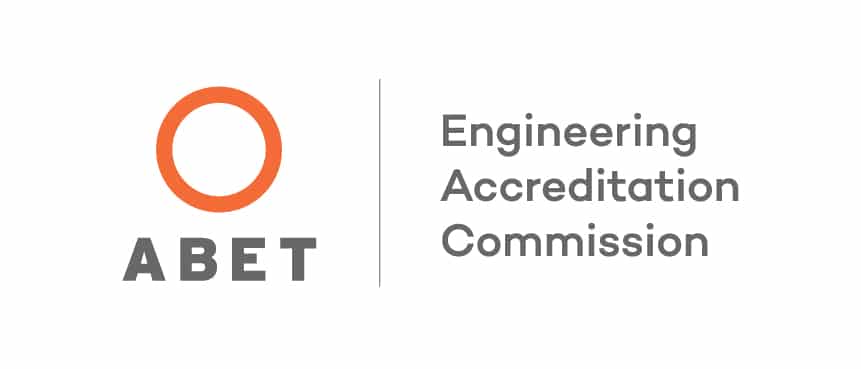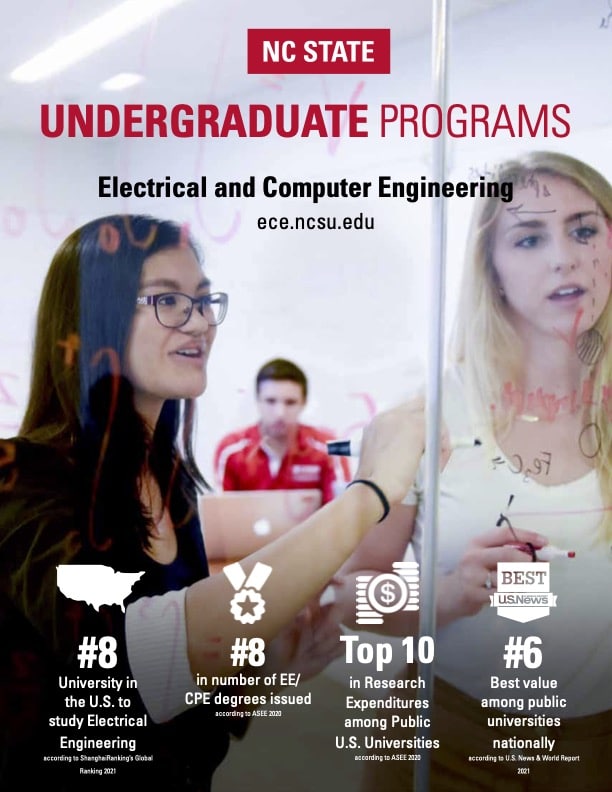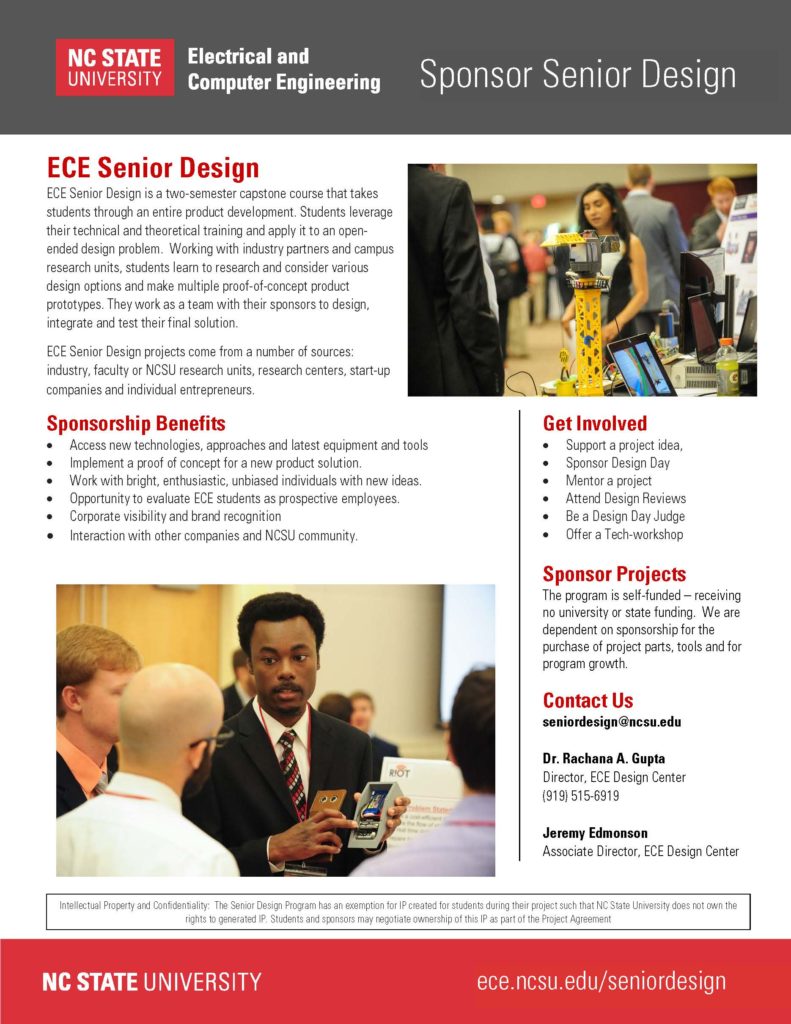Undergraduate
Programs

#8
University in the U.S. to study Electrical Engineering
according to ShanghaiRanking’s Global Ranking 2021

#5
Best value among public universities nationally
according to U.S. News & World Report

#8
In number of EE/CPE degrees issued
according to ASEE 2019
What’s Electrical Engineering?
Electrical engineers design many of the systems that we use every day, including the nation’s electrical power grid, computer systems, cell phones, communications satellites, biomedical devices, automatic control systems, robotics, nanotechnology, renewable energy, and much more. Our students use scientific and engineering principles to design new and better electronics, solve real-world challenges, and improve our quality of life.
What’s Computer Engineering?
Computer engineers design computers and computer-based systems, and their work impacts nearly every aspect of modern technology: the Internet, smartphones, video games, 3DTV, biomedical equipment, autonomous vehicles, WiFi and cellular networks, and much more. Computer engineers are, first and foremost problem solvers – they make computers work better, faster and more efficiently. Computer engineering is among the most lucrative fields in engineering, according to Forbes magazine.
Unlike electrical engineering or computer science, computer engineering primarily deals with how to build computer systems, hence there is more emphasis on hardware and low-level software that make up the systems. In contrast, computer science explores how to process information using computer systems, thus leading to a focus in software.

Revolutionize the nation’s power grid

Build the most powerful supercomputer in the world

Work on the next-generation smartphone

Invent a device capable of diagnosing tuberculosis in seconds

Launch a start-up that becomes the next big thing
Electrical Engineering and Computer Engineering - Major Exploration Series
ECE Graduates solve problems
and change the world everyday.
What do you want to fix?
Global Reputation. Individual Attention.
Electrical and computer engineers enjoy flexibility in career options and many engineering careers turn toward management as they mature. NC State University is known worldwide for providing students with the knowledge and skills necessary in all aspects of Electrical and Computer Engineering.
NC State is consistently ranked in the top ECE programs in the United States. We not only teach students the fundamentals of engineering, we give students the ability to expand and develop their own creative capabilities. Our program also strives to develop each student’s skills in all aspects of the field. This enables students to broaden their realm of knowledge to include a variety of issues that they will face in their future careers.
Extended Degree Options
Start your degree at a partner institution, get a degree from two universities at once, or get a head-start on a Master’s degree while you get your Bachelor’s degree.
Double Major
Students who complete first-year engineering requirements can apply to CODA in the EE/CPE Dual Degree program.
The curriculum follows the CPE curriculum, taking ECE 303 as the open elective, and adding three extra classes (1 foundation elective and 2 EE electives)
Powered by Renewables
ECE has partnered with the Center for Future Renewable Electric Energy Delivery and Management (FREEDM) to offer an undergraduate concentration in Renewable Electric Energy Systems (REES).
This concentration enables students to understand how to generate secure, sustainable, and environmentally friendly energy to significantly improve U.S. energy independence and reduce carbon emissions.
Your Health. Our Tech.
Our students can minor in Nano Science and Technology through our Center for Advanced Self-Powered Systems of Integrated Sensors and Technologies (ASSIST).
Students will be trained in the fundamentals of nano-scale materials, devices, and systems for a broad variety of applications within the world of wearable health monitoring systems – preparing them to contribute to this global industry.
Career Ready
Hundreds of companies and organizations actively recruit NC State graduates, including many of the top Fortune 500 companies. The university hosts the largest engineering career fair in the Southeast with employers from across the country recruiting our students—most have a job offer before graduating. NC State also goes beyond academics with career services and professional development opportunities across campus to help you get recruited.
Around 20 percent of ECE graduates end up in Silicon Valley—NC State is one of the leading providers of talent with its top companies.
MakerSpaces
In late 2016, the Department of Electrical and Computer Engineering opened the ECE MakerSpace in Engineering Building II, consisting of two facilities – the Robert M. Kolbas MakerSpace, and the William F. Troxler MakerSpace. The two spaces serve to provide all of the resources students need to realize electronics and fabrication projects, both for Senior Design and other coursework as well as extracurricular and personal experimentation and creation.
The Kolbas MakerSpace provides all the tools required for students to work on electrical projects with state-of-the-art testing and soldering stations, Pick-and-Place component placement machine, in addition to a dozen 3-D printers to aid in prototyping.
The Troxler MakerSpace allows for fully-fledged fabrication with a complete wood and metal workshop, including a ShopBot CNC router and a WAZER waterjet cutter.
The MakerSpace enables and encourages students to be involved in hands-on engineering projects in their coursework and of personal interest.
Hands-on Education
Student learn best by doing, so ECE has adopted the Analog Discovery unit throughout our curricula, aiming to accelerate and deepen learning, and have more fun.
The Analog Discovery 2 is a portable and full-featured toolbox that can measure, visualize, generate, record, and control both analog and digital signals. It packs enough punch that it can be used to study and design the vast majority of circuits and signals in our ECE program, augmenting hands-on experiences with traditional desktop workstations.
Senior Design
The ECE Senior Design experience is a two-semester course (ECE 484\ECE485) designed to prepare students for the workplace through hands-on experience in the design and development of a real-world solution. Students learn about the product life cycle and about development processes utilizing system engineering and project management techniques.
Students working in teams start with a problem statement, then define product requirements, evaluate possible solutions and perform design tradeoff analyses, then define a system solution, develop a project plan, and share a presentation of their system design and plan at a design review. Next students complete their detailed design and then build a working prototype and verify their solution. Students then present their prototype solutions at Engineering Design Day.
Finally, students document their design process and design solution in a final report. The final report also includes a summary of lessons learned and possible future enhancements.

Stringent Accreditation
Both the Electrical Engineering and Computer Engineering programs at NC State are accredited by the Engineering Accreditation Commission of ABET
Military & Veterans
The world needs great leaders like you. That’s why we are committed to helping veterans, active-duty military personnel and their families earn a first-rate engineering education from NC State.
Whether you are on active duty or transitioning from service, you need a program that does not require you to put the rest of your life on hold.
We can help. NC State’s online engineering and computer science programs allow you to get the same top-tier education as your on-campus peers — at a location and time convenient for you.
Learn more about Engineering Online for veterans and military personnel.
Scholarship Opportunities
A wide variety of scholarship opportunities exist for students in the ECE department, in addition to those offered by the University and the College of Engineering—these opportunities span a range of criteria, from academic performance, to need, to area of study.
Your Return on Investment
Earning potential for Electrical and Computer Engineers in the twenty-first century is excellent. The average first term co-op (cooperation education) earns approximately $18.00/hour.
- New BS graduates start out earning an average of $58,000 per year.
- The new MS graduate earns an average of $71,000 per year.
- Graduates who acquire a Ph.D. start at average earnings above $80,000 per year.
Both degrees are also excellent entry points for careers in patent law, business, management, or medicine. The opportunity to develop new technologies and improve existing ones help to make a career in ECE both challenging and exciting. Our graduates don't just work with tomorrow's technology, they create it.

Transfer in from Outside Institutions
If you are a student seeking to transfer into the Department of Electrical and Computer Engineering at NC State University from an outside college or university, you should know how classes taken at an external institution transfer over as credit into the NC State Credit System. Follow this link for a list of AP scores that qualify for meeting transfer admission coursework requirements.
College-level work must be completed with a C or better grade at a regionally accredited institution to be considered for admission/transfer credit. Work completed in technical programs is not considered for transfer credit or GPA calculation. Credits awarded by another institution without a letter grade of C or higher cannot be used to meet admissions requirements.
You can browse Admissions Databases which detail which courses from other institutions with transfer to NC State.
Centennial Campus
The Raleigh-Durham area is consistently listed as one of the best places to live in the country. Located just a few miles from the “epicenter of innovation”—Research Triangle Park—our students and graduates have abundant opportunities for internships, co-ops, and employment with leading technology companies. When it’s time to relax and take a break, the beaches and mountains of North Carolina are an easy drive from Raleigh.
Long known as a national hub for research, innovation and public-private partnership, Centennial Campus is home to the College of Engineering and a number of research centers, institutes, and laboratories. Not to mention 76 industry, government and nonprofit partners.
But it’s more than a research park.
Centennial Campus is a bustling—and growing —community. A sprawling landscape with walking trails, a championship golf course, restaurants, condos and a hotel. A mini-city nestled around Lake Raleigh. And, just as important, a destination for fun.
You can catch a movie on the vast Oval Lawn, chow down at a food truck rodeo, enjoy a live concert on the shore, and kayak by moonlight on the lake (not all at once, of course).
The state-of-the-art campus is a collision of learning, research, and innovation—leading to game-changing advancements and technologies that shape the world.
An entrepreneurial campus
135+
Startups Launched
1,010+
U.S. Patents issued
595+
Products to Market
Visit ECE
Don’t just look at the pictures, please come visit our ECE facilities on Centennial Campus and see all that we have to offer.
Courses
See the full Course Catalog for more information.
Questions
Still have questions about the ECE program? Send an inquiry into our Undergraduate Office and we’ll be in touch.
If your question is about acceptance into NC State or Engineering, please contact engineering@ncsu.edu



